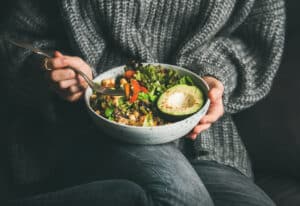Plastic seems to have come very much into our collective consciousness in the last few years, triggered by the environmental repercussions of its over use, we strive to minimise waste and become plastic free. But have you ever thought about this ubiquitous product, or why it may not only be harming our planet but our health too?
Plastics could indeed be playing a role in your fertility journey; namely BPA – Bisphenol A.
What is BPA?
BPA is an industrial chemical used to make epoxy resins and polycarbonate. Polycarbonate is one of the most commonly used plastics, found in food storage containers, the lining of food and drink cans and paper receipts.
On exposure to heat (hot water, microwaves) and detergents such as washing up liquid, BPA’s are known to leach from plastic products, from this point on, the product will continue to leach chemicals into the the food stored or prepared within. On contact with thermally printed till receipts, plane tickets, cinema tickets, small amounts of BPA will be absorbed through the skin.
History of BPA
As early as 1936, BPA was trialled by pharmaceuticals as a synthetic oestrogen, known for its oestrogen mimicking activity, however as stronger chemicals were discovered, BPA was rejected for this purpose. In the 1960’s BPA plastics were first manufactured. By the 1990’s, a chance experiment led researchers to link BPA to a dramatic rise in chromosomal abnormalities in mice embryos.
BPA and Fertility
Following this shocking research finding in the 90’s, hundreds of subsequent research papers have found that BPA is not only toxic to developing eggs but additionally disrupts the hormones that coordinate the delicate process of reproduction, and thyroid function.
In 2012 a group of Harvard researchers speculated that BPA may also interfere with the environment in the uterus, reducing the ability of the embryo to implant. Whilst women with diminished ovarian reserve (common in ageing) are more sensitive to the effects of BPA: worsening already challenged fertility.
BPA in our everyday
In Australia, nothing has been done to reduce our exposure to BPA’s other than the introduction of a voluntary phase-out by retailers of BPA containing polycarbonate in plastic baby bottles and dummies. Although a positive, and vital step in protecting our children, these chemicals remain prevalent in many of the everyday plastic products our children and the rest of the population encounter multiple times a day.
FSANZ Food Standards Australia & New Zealand still maintains that BPA is harmless at current levels of exposure, despite substantial evidence to the contrary.
Limiting Exposure
Limiting our exposure to BPA is not only important to those of you wanting to become pregnant. Hormone disruptors are a danger to everyone, naturally more so to babies and infants since immature detoxification systems coupled with rapid growth can make children particularly vulnerable to the effects of these chemicals.
In the wider population, BPA has been linked to hormonal abnormalities, breast and prostate cancer, asthma, behavioural issues, and obesity. Limiting your BPA exposure during pregnancy is additionally critical for the health of your baby, since BPA can cross the placenta.
In terms of fertility, the most important time to avoid BPA exposure is in the 3-4 months before you try to conceive, though in reality, the sooner the better.
BPA Detoxification
On a more positive note, a promising 2009 study noted that reducing your exposure to BPA laden plastics, can lead to significant and rapid decreases in urinary BPA levels.
These reductions in urinary BPA levels were noted over just three days of reducing exposure by eating fresh foods instead of canned and using glass containers instead of plastic. In just 72 hours, participants saw their levels plummet by 66 percent.
Practical tips to minimise exposure to BPA’s
- Swap plastics in the kitchen for glass, stainless steel, porcelain and ceramic products.
- Avoid pod coffee machines – the pods are classically made with BPA containing plastics, opt for a french press coffee. Alternatively, Sealpod make reusable stainless steel coffee pods.
- Cut back on canned foods and drinks, the lining of cans contain BPA’s.
- Handle receipts only when necessary, washing hands soon afterwards.
By Josie Penn ~ Nutritional Therapist
Josie Penn is a Nutritional Therapist based in Melbourne. Josie specialises in fertility, pregnancy and postpartum nutrition. She has 7 years of clinical experience working as a freelance Nutritional Therapist in the UK, New Zealand and Australia. Josie is an experienced speaker, leading educational talks and workshops for expectant and new parents from clinics across Melbourne.
www.josiepenn.com




